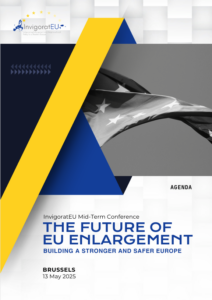Headquarters: Svetog Nauma 7, 11000
Office address: Đorđa Vajferta 13, 11000
Phone:: +381 11 4529 323

24 November 2021 – Today, the European Policy Centre (CEP), together with other members of Think for Europe Network (TEN) and the Directorate-General for Neighbourhood and Enlargement Negotiations (DG NEAR) organised an online discussion about the European Commission’s 2021 Enlargement Package. The event titled: EU Enlargement to the Western Balkans in the Light of the New Methodology gathered acting Director-General, Maciej Popowski, who presented this year’s reports, and CSOs representatives from six Western Balkans countries who discussed and commented on reports for each state. The panel was moderated by Milena Lazarević, CEP’s Programme Director. Panellists discussed how does the Enlargement Package support the building of a stronger Europe, what are the incentives offered to the Western Balkans through this Package, and does the current toolkit possess enough tools to deal with regional’s sensitive, yet complex issues while addressing the Fundamentals.
Mr. Popowski called, in his presentation, this year’s package “the mother of all packages” which comes after the visit of President Commission Ursula von der Leyen to Western Balkans in September and the Brdo Summit in October. He emphasised the necessity to maintain dynamics of the enlargement process despite the odds while underlining recommendations of the Commission to open two new Clusters with Serbia, finally start negotiations with North Macedonia and Albania and secure visa liberalisation for Kosovo. Popowski stated that bilateral issues between Bulgaria and North Macedonia cast a big shadow on the enlargement and that there is very little time to find an agreement between the two countries to Bulgaria remove its veto. At the same time, Commission has sent its representatives to Bosnia and Herzegovina to find a way for overcoming institutional stalemate in this country. On the question about scepticism in some member states when it comes to further enlargement of the EU, Popowski pointed out that there has always been scepticism, but that we must avoid further disillusionment among citizens in candidate states. Asked about the model of staged accession, Popowski stated that he is entirely familiar with it, but he compared it with ideas from the 1990s about the EU in concentric circles. Finally, he sees the Open Balkan initiative as a part of a broader concept of regional cooperation and as a stepping stone towards the accession of the WB region to the EU, not as a substitute.

On the other hand, representatives of civil society and members of TEN (Srđan Majstorović, Chairman of Governing Board, European Policy Centre (CEP), Belgrade, Haris Ćutahija, Researcher, Foreign Policy Initiative (FPI BH), Sarajevo, Marko Sošić, Policy Analyst, Institute Alternative (IA), Podgorica, Arbëresha Loxha Stublla, Executive Director and Senior Research Fellow, Group for Legal and Political Studies (GLPS), Pristina, Gjergji Vurmo, Programme Director, Institute for Democracy and Mediation (IDM), Tirana, Ardita Abazi Imeri, Programme Coordinator, European Policy Institute (EPI), Skopje) criticised the politically correct wording of the report, stating that it was much softer than in previous years. Critics have been directed towards new enlargement methodology as well, stating that the ticking the box approach was not overcome and that introduced reforms are only structural, rather than substantial. They also called for elephant in the room to be said out loud clearly which is a lack of political will on both sides. Lastly, CSO representatives from six WB countries called the Commission for more evidence-based reports in the future and for transparently providing sources in upcoming reports. They expressed hope for more positive reports next year.